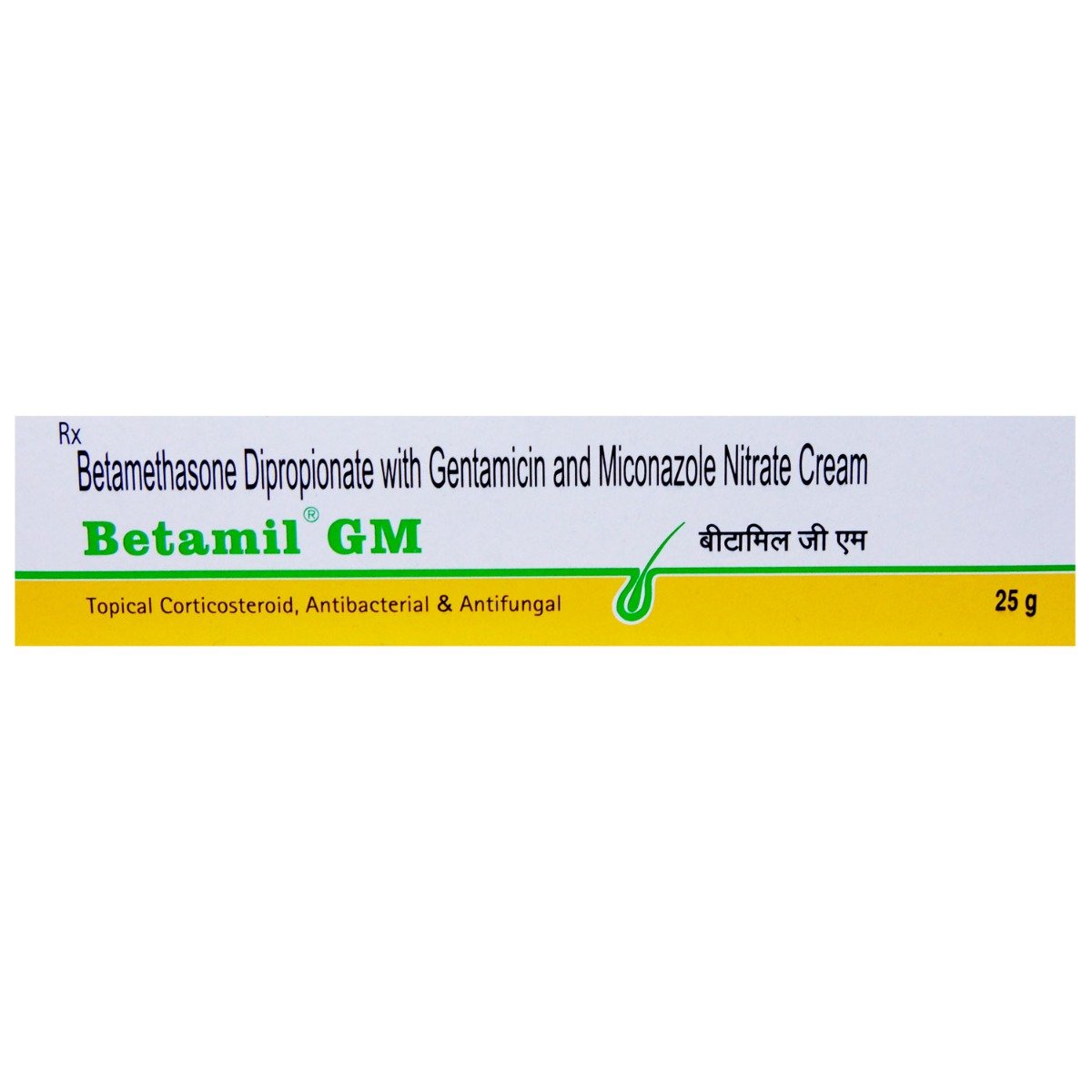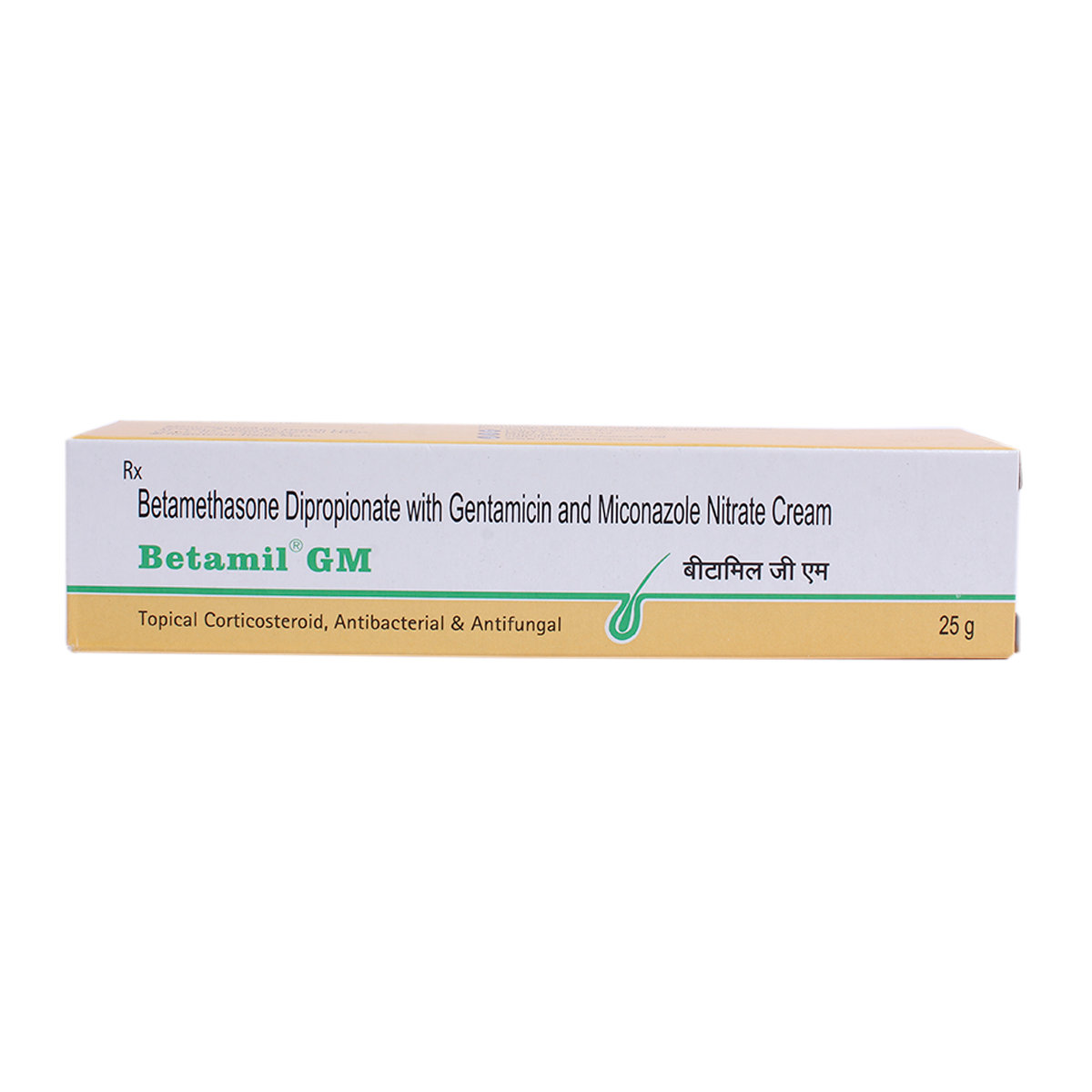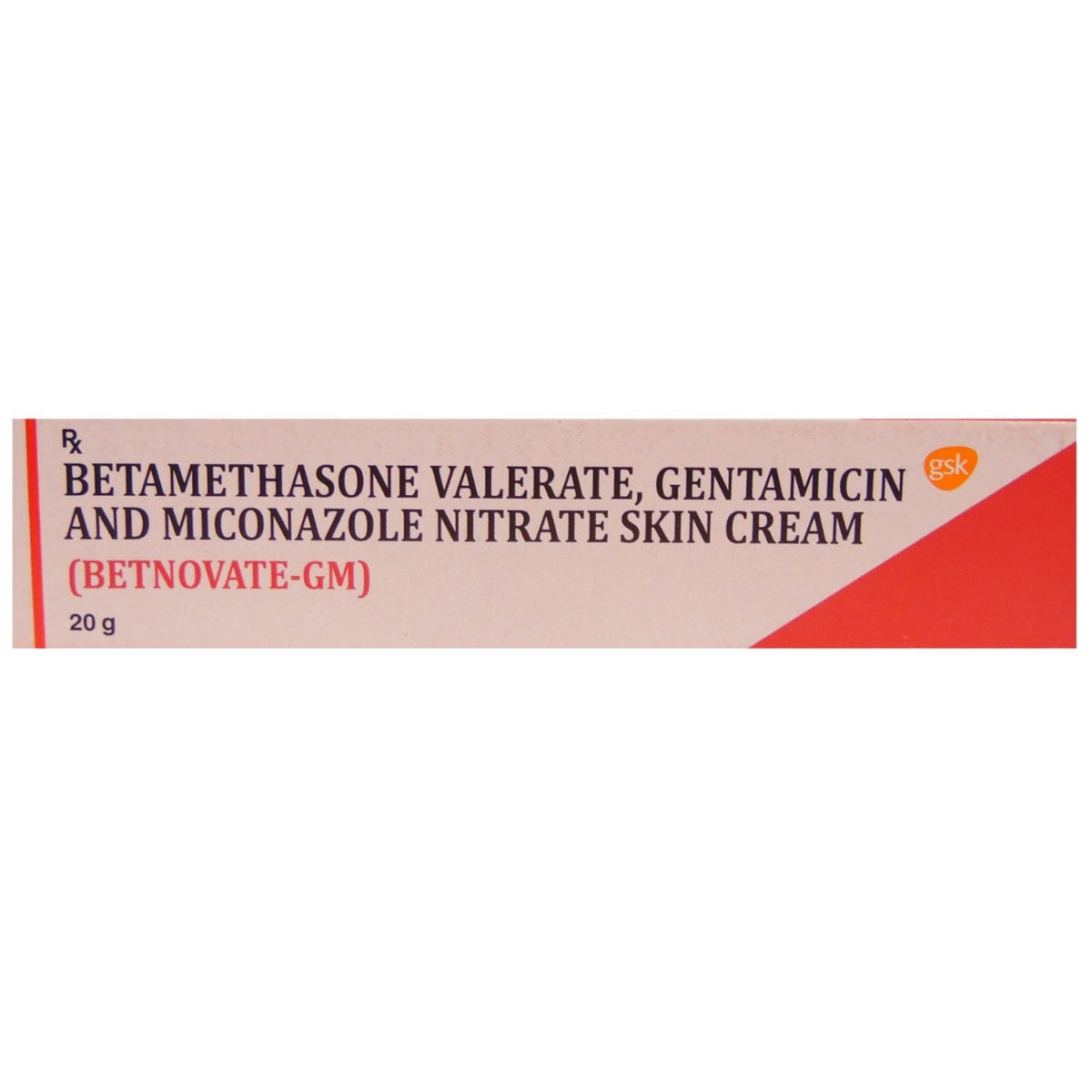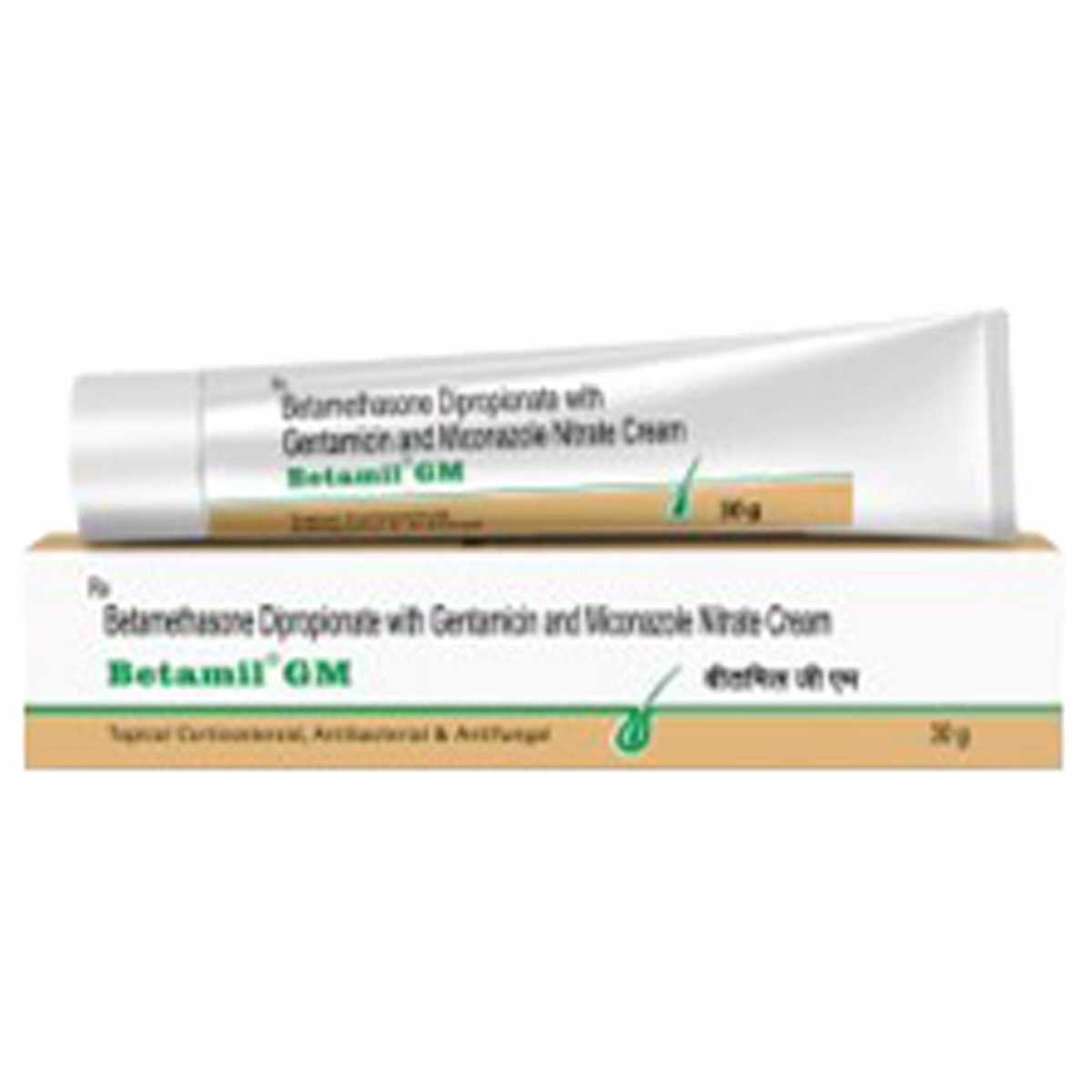Betamethasone+gentamicin+miconazole
About Betamethasone+gentamicin+miconazole
Betamethasone+gentamicin+miconazole is used to treat skin conditions like eczema (itchy, inflamed skin), psoriasis (red, itchy, scaly patch on skin), and other types of rash. Also, Betamethasone+gentamicin+miconazole helps to reduce swelling, itching, and redness caused by specific skin problems. Fungal infection is a skin disease in which a fungus infects the tissue. Fungal infections can be contagious, spreading from one person to another. A bacterial infection is a condition in which harmful bacteria grow in the body and cause an infection. It can infect any part of the body and multiply very quickly.
Betamethasone+gentamicin+miconazole is a combination of three drugs: Betamethasone (a corticosteroid), Gentamicin (an antibiotic), and Miconazole (an antifungal). Betamethasone belongs to the class of corticosteroids that work by acting inside skin cells and inhibiting the release of certain chemical messengers in the body that cause redness, itching, and swelling. When the skin reacts to any allergens, such chemicals are typically released. Gentamicin works by causing bacteria to produce faulty and abnormal proteins. Thus, it kills the bacteria and clears the infection. The fungal cell membranes are essential for their survival as they prevent the entry of unwanted substances into the cells and stop the leakage of cell contents. Miconazole belongs to the class of antifungals that work by causing holes in the fungal cell membranes and killing fungi.
Betamethasone+gentamicin+miconazole is for external use only. Take a small amount of Betamethasone+gentamicin+miconazole on your finger and apply it as a thin layer to the clean, dry affected area. Avoid contact of Betamethasone+gentamicin+miconazole with nose, ears, mouth, or eyes. If Betamethasone+gentamicin+miconazole comes into contact with these areas accidentally, rinse thoroughly with water. Some people may experience skin peeling, dry skin, itching, redness, irritation, or a burning sensation at the site of application. Most of the side effects of Betamethasone+gentamicin+miconazole do not require medical attention and usually resolve on their own over time. However, if the side effects worsen or persist, please consult your doctor.
If you are allergic to Betamethasone+gentamicin+miconazole, iodine, or any other medicines, please tell your doctor. If you are pregnant or a breastfeeding mother, it is advised to consult a doctor before using Betamethasone+gentamicin+miconazole. Do not use Betamethasone+gentamicin+miconazole in more than prescribed doses or for a prolonged time, as it may cause adverse effects. Do not wrap or cover the treated area with airtight dressings unless your doctor advises you to do so. Do not swallow Betamethasone+gentamicin+miconazole. In case of accidental swallowing, consult a doctor immediately. If you have glaucoma, cataracts, diabetes, adrenal gland or kidney problems, asthma, myasthenia gravis (muscle weakness), Parkinson’s disease, or other skin problems, inform your doctor before taking Betamethasone+gentamicin+miconazole.
Uses of Betamethasone+gentamicin+miconazole
• Eczema management: Betamethasone+gentamicin+miconazole relieves afflicted regions by lowering eczema-related inflammation, itching, and redness.
• Psoriasis Treatment: It can be used to treat psoriasis symptoms, such as pain and scaling, by encouraging skin hydration and healing.
• Allergic Reaction Relief: Betamethasone+gentamicin+miconazole efficiently soothes inflamed skin by reducing allergic skin reactions.
• Dermatitis Control: This medication helps soothe inflamed skin and reduce swelling in various forms of dermatitis.
• Antifungal Activity: Betamethasone+gentamicin+miconazole contains an antifungal ingredient that helps cure fungal skin infections and provides targeted treatment for conditions like athlete's foot and ringworm.
Medicinal Benefits
Betamethasone+gentamicin+miconazole is a combination of three drugs: Betamethasone, Gentamicin, and Miconazole. Betamethasone+gentamicin+miconazole is used to treat fungal and bacterial skin infections. Also, Betamethasone+gentamicin+miconazole helps to reduce swelling, itching, and redness caused by specific skin problems. Betamethasone is a corticosteroid that acts inside skin cells and inhibits the release of certain chemical messengers in the body that cause redness, itching, and swelling. When the skin reacts to allergens, these chemicals are usually released. Gentamicin is an antibiotic that causes bacteria to produce faulty and abnormal proteins. Thus, it kills the bacteria and clears the infection. The fungal cell membranes are essential for their survival as they prevent the entry of unwanted substances into the cells and stop the leakage of cell contents. Miconazole is an antifungal that works by causing holes in the fungal cell membranes and kills fungi.
Directions for Use
- Follow your doctor's instructions on the dosage and timing of this medication to ensure safety.
- Take a small amount of Betamethasone+gentamicin+miconazole on the fingertip and apply it as a thin layer on the clean and dry affected area as advised by your doctor.
- Betamethasone+gentamicin+miconazole is only for external use. Avoid contact of the Betamethasone+gentamicin+miconazole with the nose, mouth or eyes. In case of accidental contact with these areas, rinse with water thoroughly.
Storage
Side Effects of Betamethasone+gentamicin+miconazole
- Skin peeling
- Dry skin
- Itching, redness, irritation or burning sensation at the site of application
Drug Warnings
If you are allergic to Betamethasone+gentamicin+miconazole, iodine, or any other medicines, please tell your doctor. If you are pregnant or breastfeeding, it is recommended to consult a doctor before using Betamethasone+gentamicin+miconazole. Do not use Betamethasone+gentamicin+miconazole in more than prescribed doses, or for a prolonged time, as it may cause adverse effects. Wear disposable plastic gloves or wash your hands after use if you are applying Betamethasone+gentamicin+miconazole for others. Do not wrap or cover the treated area with airtight dressings unless your doctor advises you to do so. Do not swallow Betamethasone+gentamicin+miconazole. In case of accidental swallowing, consult a doctor immediately. If you have glaucoma, cataracts, diabetes, adrenal gland or kidney problems, asthma, myasthenia gravis (muscle weakness), Parkinson’s disease, or other skin problems, inform your doctor before taking Betamethasone+gentamicin+miconazole.
Drug Interactions
Drug-Drug Interaction: Betamethasone+gentamicin+miconazole may interact with anticoagulants (warfarin, dicumarol, anisindione).
Drug-Food Interaction: Betamethasone+gentamicin+miconazole may interact with grapefruit juice. Therefore, avoid the intake of grapefruit juice with Betamethasone+gentamicin+miconazole as it may lead to severe adverse effects.
Drug-Disease Interaction: If you have glaucoma, cataracts, diabetes, adrenal gland or kidney problems, asthma, myasthenia gravis (muscle weakness), Parkinson’s disease or other skin problems, inform your doctor before taking Betamethasone+gentamicin+miconazole.
Drug-Drug Interactions Checker List:
Safety Advice

Alcohol
cautionInteraction of Betamethasone+gentamicin+miconazole with alcohol is unknown. Please consult a doctor before consuming alcohol while using Betamethasone+gentamicin+miconazole.

Pregnancy
cautionThe safety of Betamethasone+gentamicin+miconazole in pregnant women is unknown. Therefore, it is given to pregnant women only if the doctor thinks benefits outweigh risks.

Breast Feeding
cautionIt is unknown whether Betamethasone+gentamicin+miconazole is excreted in human milk. It is given to breastfeeding mothers only if the doctor thinks benefits are greater than risks.

Driving
safe if prescribedBetamethasone+gentamicin+miconazole usually does not affect your ability to drive or operate machinery.

Liver
cautionIf you have any concerns regarding the use of Betamethasone+gentamicin+miconazole in patients with Liver problems, please consult a doctor.

Kidney
cautionIf you have any concerns regarding the use of Betamethasone+gentamicin+miconazole in patients with Kidney problems, please consult a doctor.

Children
cautionBetamethasone+gentamicin+miconazole should be used with caution and in doses only as prescribed by a doctor.
Habit Forming
Diet & Lifestyle Advise
- Regularly change your socks and wash your feet. Avoid shoes that make your feet sweaty and hot.
- In wet places such as changing rooms and gym showers, don’t walk barefoot. Wear flip-flops or sandals to prevent fungal infections.
- Do not scratch the affected area of the skin as it can spread the infection to other body parts.
- Avoid sharing towels, combs, bedsheets, shoes, or socks with others to prevent the spread of infection.
- Wash your bed sheets and towels regularly.
- Eat foods rich in quercetin (a flavonoid) such as apples, cherries, broccoli, spinach, and blueberries.
- Consuming food rich in probiotics helps in developing the immune system against allergies.
- Limit intake of food that might trigger allergies such as dairy products, soy, eggs, and nuts.
- Avoid consumption of foods with excess sugar as it may flare up inflammation.
- Include fruits, vegetables, whole grains, healthy fats, and fish in your diet.
- Avoid getting in contact with harsh soaps, detergents, and rough fabrics.
Special Advise
Avoid contact of Betamethasone+gentamicin+miconazole with nose, mouth or eyes. If Betamethasone+gentamicin+miconazole comes into contact with these areas accidentally, rinse them thoroughly with water.
Patients Concern
Disease/Condition Glossary
Fungal infection: It is a skin disease in which a fungus infects the tissue. Fungal infections can be contagious, spreading from one person to another. The symptoms of a fungal infection include scaly skin, blisters, itching, swelling, irritation, and redness. Antifungal medicines are usually used to treat fungal infections.
Bacterial infection is a condition in which harmful bacteria grow in the body and cause infection. It can target any part of the body and multiply very quickly. Bacteria come in three basic shapes: spherical, rod-shaped, or spiral-shaped. Bacteria may be gram-positive (have thick cell walls) or gram-negative (do not have cell walls). Appropriate tests are done to identify bacterial strains, and based on the results, proper medication is prescribed. Some common symptoms of bacterial infection include cough, fever, and tiredness.
FAQs
Betamethasone+gentamicin+miconazole is used to treat bacterial and fungal skin infections. It works by killing the infection-causing organisms and inhibiting chemical messengers in the body that cause redness, itching, and swelling.
No, Betamethasone+gentamicin+miconazole is not used to treat diaper rash as using Betamethasone+gentamicin+miconazole under child’s nappy enables Betamethasone+gentamicin+miconazole to pass through the skin easily and cause adverse effects. However, please consult a doctor before using Betamethasone+gentamicin+miconazole in children.
Yes, Betamethasone+gentamicin+miconazole may cause skin irritation at the site of application as a side effect. However, if the irritation worsens or persists, stop using Betamethasone+gentamicin+miconazole and consult a doctor.
You are recommended to cover the treated area of skin with bandages or dressings only if advised by your doctor else it may increase the risk of side effects.
You are recommended to use Betamethasone+gentamicin+miconazole for as long as your doctor has prescribed it. However, if the condition persists or worsens after 1 week of treatment with Betamethasone+gentamicin+miconazole, please consult a doctor.
Yes, fungal infection is a contagious skin condition which spreads from one person to another through direct skin to skin contact or by contact with contaminated soil or surfaces and infected animals. Therefore, it is recommended to avoid close direct contact until the infection is clear and avoid sharing things with the infected person as it can also spread the infection.
No, you are not recommended to stop using Betamethasone+gentamicin+miconazole without consulting your doctor as it may worsen the condition or cause recurring infection. Therefore, take Betamethasone+gentamicin+miconazole for as long as your doctor has prescribed it, and if you experience any difficulty while taking Betamethasone+gentamicin+miconazole, please consult your doctor.
Betamethasone+gentamicin+miconazole is not recommended for use on the face for spots as it contains betamethasone, a corticosteroid which may cause skin thinning and redness.
Betamethasone+gentamicin+miconazole is not recommended for pimples or acne because Betamethasone+gentamicin+miconazole contains betamethasone, a corticosteroid can sometimes worsen acne.
Betamethasone+gentamicin+miconazole can be applied on the face only if the doctor has recommended it based on your medical condition.
You may experience side effects like difficulty breathing, dizziness, redness and itching at the site of application if you are allergic to Betamethasone+gentamicin+miconazole. Consult the doctor if you notice any of these symptoms.
You should not stop using Betamethasone+gentamicin+miconazole even though you feel better as it may worsen the condition or cause infection to recur. Always use Betamethasone+gentamicin+miconazole for the duration the doctor has prescribed it.
Betamethasone+gentamicin+miconazole can be used with caution and only if the doctor has prescribed it. Please consult the doctor if you have any concerns.
Betamethasone+gentamicin+miconazole is for external use only. Apply a small amount on your fingertip and gently spread as a thin layer over the clean, dry affected area as prescribed by the doctor.
If Betamethasone+gentamicin+miconazole comes in contact with eyes, rinse off with plenty of water thoroughly. If you still feel any discomfort consult the doctor immediately.
The side effects of Betamethasone+gentamicin+miconazole include dry skin, itching, skin peeling, redness, irritation, or burning sensation at the site of application. Consult the doctor if any of these side effects persist or worsen.
If you have missed the dose, apply Betamethasone+gentamicin+miconazole as soon as you remember. If it's nearly time for your next dose, skip the missed dose.
No, Betamethasone+gentamicin+miconazole should not be used for fairness as it is used to treat fungal and bacterial infections of the skin and helps to reduce itching, swelling, and redness caused by certain skin problems.
Betamethasone+gentamicin+miconazole should be used as a doctor has prescribed it. The doctor will determine the duration of treatment based on your medical condition.
Betamethasone+gentamicin+miconazole is not recommended for use in private parts. Consult the doctor if you have any concerns.
Yes, Betamethasone+gentamicin+miconazole is used for fungal skin infections. It works by killing the infection-causing organisms and inhibiting chemical messengers in the body responsible for redness, itching, and swelling.
Yes, Betamethasone+gentamicin+miconazole can be used for ringworm as it is a fungal infection. It works by killing the micro-organisms and helps to treat the infection.
No, Betamethasone+gentamicin+miconazole is not recommended to treat pigmentation as it is indicated for the treatment of skin infections.
Betamethasone+gentamicin+miconazole starts working as soon as you apply it. However, it may take several days to weeks for your symptoms to improve.
Avoid prolonged or excessive usage of Betamethasone+gentamicin+miconazole. Use only as prescribed by the doctor. Avoid contact with eyes, nose, mouth and ears. If Betamethasone+gentamicin+miconazole comes in contact accidentally with these areas, rinse off with plenty of water. Do not cover the treated areas and avoid using it on sensitive areas. Consult the doctor before using Betamethasone+gentamicin+miconazole if you have diabetes, glaucoma, asthma, cataracts, Parkinson’s disease, adrenal gland problems, kidney problems, myasthenia gravis (muscle weakness), or other skin problems.
You should not use higher than the recommended dose of Betamethasone+gentamicin+miconazole or for long periods as it may cause adverse effects. You should use Betamethasone+gentamicin+miconazole in doses and duration prescribed by the doctor based on your health condition.
Betamethasone+gentamicin+miconazole should be stored in a cool and dry place away from sunlight. Keep it out of sight and reach of children.
Consult the doctor before taking Betamethasone+gentamicin+miconazole with other medicines to avoid any interactions/side effects.
Avoid using Betamethasone+gentamicin+miconazole if you are allergic to any of the ingredients as it may cause side effects like difficulty breathing, dizziness, redness and itching at the site of application.
Betamethasone+gentamicin+miconazole should be used during pregnancy or breastfeeding if prescribed by the doctor. Consult the doctor before using Betamethasone+gentamicin+miconazole if you are pregnant or breastfeeding. The doctor may prescribe it if the benefits outweigh its risks.






